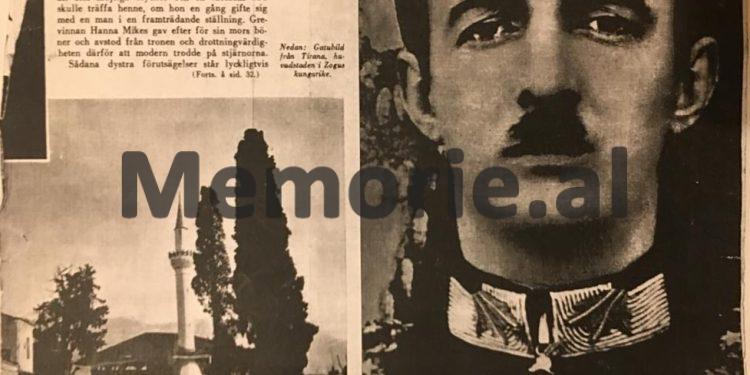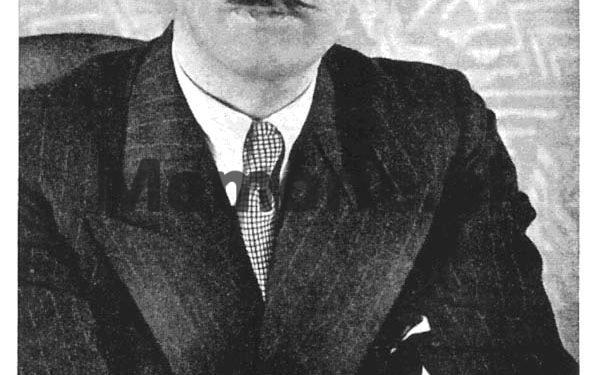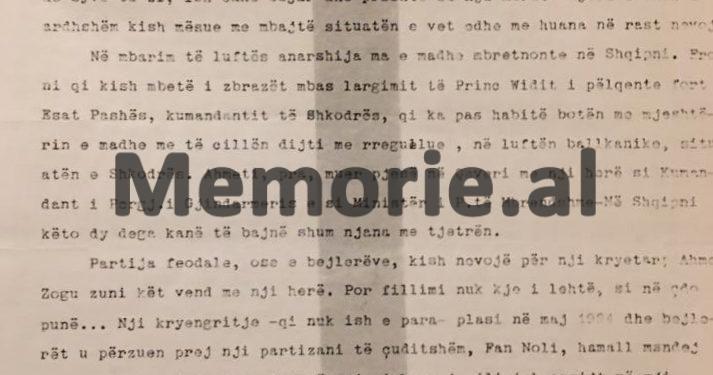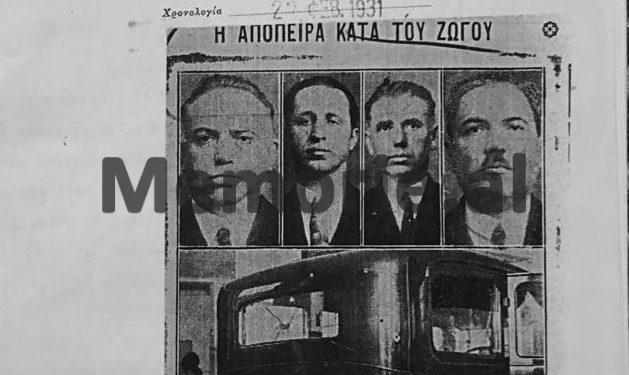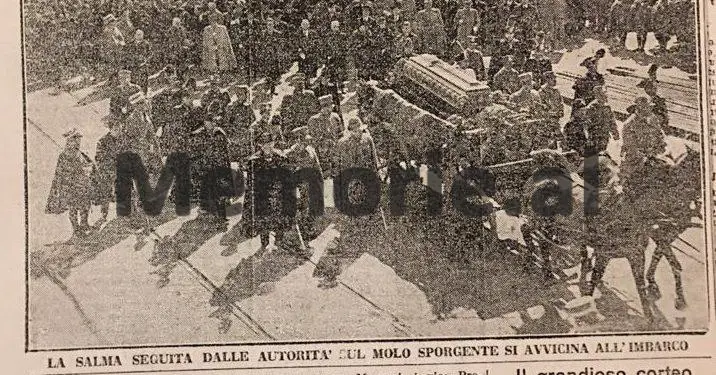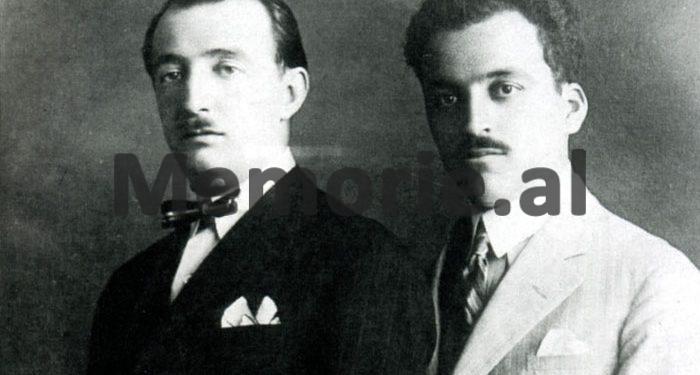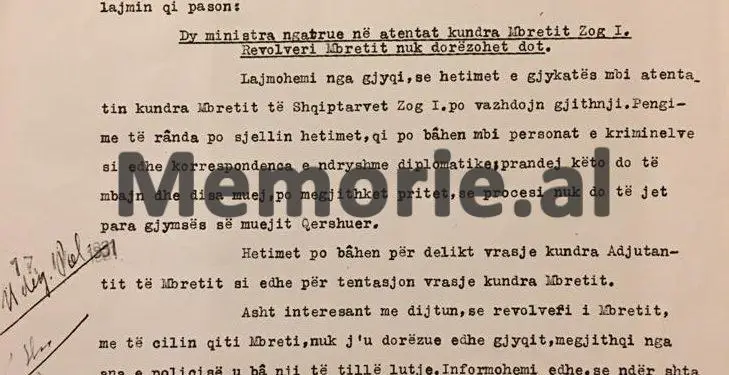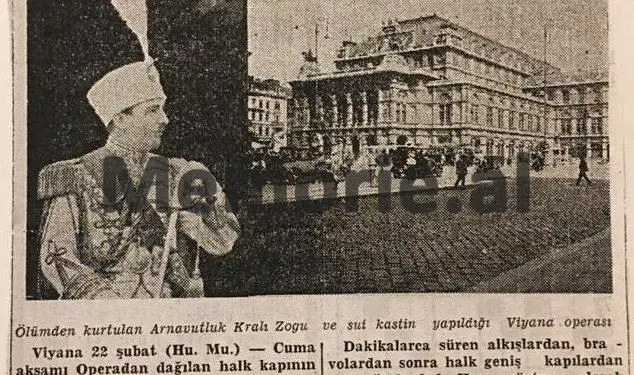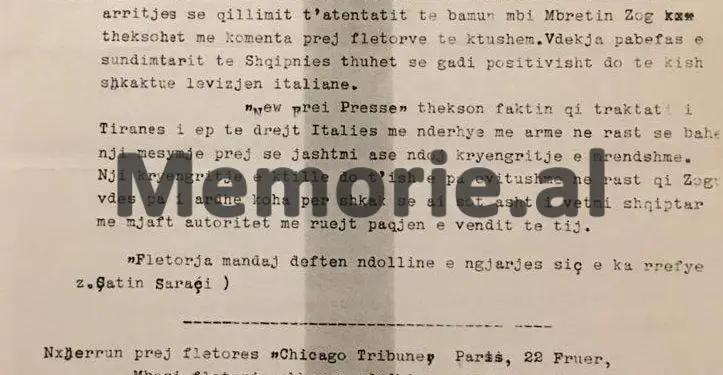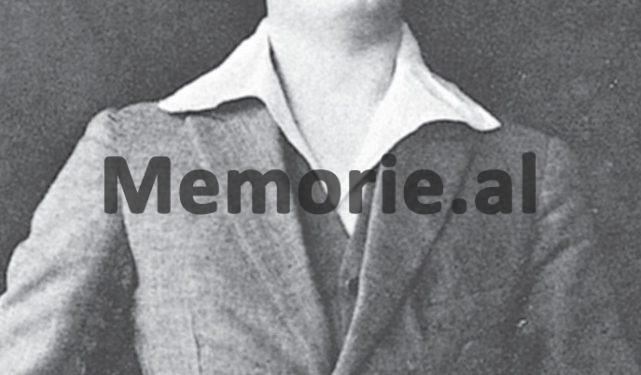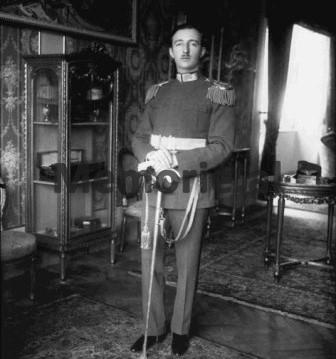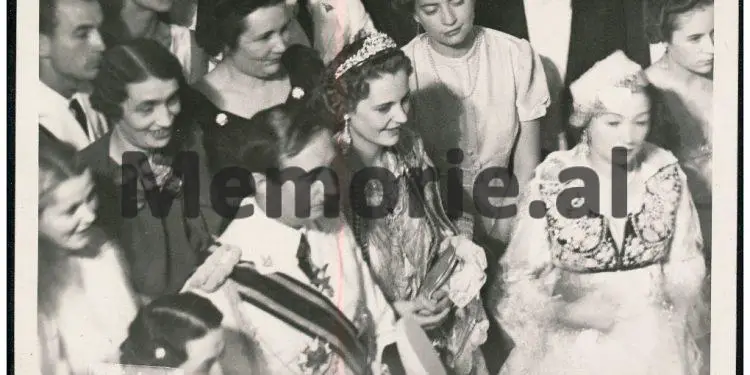Dashnor Kaloçi
Memorie.al publishes the unknown story of the assassination attempt on King Zog on February 20, 1931 while he was in Vienna for treatment, by a group of Albanian political emigrants living in the Austrian capital, led by Ndok Gjeloshi, Aziz Çami, two former officers of the Albanian Army who had taken part in the June 1924 Uprising, as well as Qazim Mulleti and Angjelin Suma, who after ambushing at the main gate of the Vienna Opera House, shot several times with their revolvers against Zog and his adjutants, while he was getting into his vehicle that was waiting for him nearby, leaving Major Llesh Topallaj killed on the spot and injuring the Minister of Foreign Affairs of Albania, Ekrem bej Libohova . How was that news conveyed and the whole story of the assassination of King Zog who miraculously escaped untouched by the assassins’ bullets, in the biggest newspapers of Europe and the USA, such as: “The New York Herald”, ” “Daily Telegraph”, “Daily Expres”, “Chicago Tribune”, “Moring Post”, “Universul”, “Daily Herald”, etc., which found the opportunity and published for several months on their pages dozens of articles, where In addition to the event in question, many articles were dedicated to King Zog’s friendship with the Austrian Baroness Maria de Janko and her sister, Franciska de Janko, who had been in Tirana for some time and with Zog’s visit to Vienna, they too had gone. there being accommodated in the Hotel “Regina”, where the King of Albanians during all those days, often frequented them and went out with them for walks in the most beautiful parks of Vienna.
“A savage attack on the King of Albania Zog, took place late tonight in Vienna where the King had come to recover from Neurasthenia and nicotine poison. King Zog with his suite and some Austrian officials had just left the Opera House where he was playing “The Legend of Joze”, contacted by Richard Straus, and as he was taking his place in the car waiting for him outside the opera, revolver blasts were heard. on both sides of the car. The assailants, two people dressed well in their clothes at night, fired rifles at the windows of the car from a close distance. Zog’s men surrounded the car and pulled the revolvers out of their belts and fired at the catapults with a coolness, presumably at the top of the mountains in the heart of Albania and not near the great Vienna Opera. Major Topollaj, one of the King’s suites, together with a braver minister, sacrificed their lives to bravely face the rain of bullets in order to save their King. Topallaj fired four times with a revolver before falling to the ground before a bullet hit him. The Major, his minister, Marshall Libohova, who has a large body, fell to the ground before the King and continued to lie on the benches, which were repulsed until he received a bullet in the dagger. Twelve more were made upon the King, and his salvation seemed a marvelous thing. The Katilas, unable to achieve their goal, tried to retaliate, but the people of Vienna, angered by the use of the generosity of their city, seized the Katilas and beat them badly, until the police arrived. Both cats were sent to a prison and are now being questioned. “King Zog, who kept his composure during this event, took a car and went to the Imperial Hotel on the Ring Strasse where he has lived since he came to Vienna.”
This is what is written, among other things, in the British newspaper “Daily Express” dated February 21, 1931, which in its main pages gave the news of the assassination of King Zog by a group of Albanian political emigrants led by : Ndok Gjeloshi, Aziz Çami, Qazim Mulleti and Angjelin Suma, who lived as asylum seekers in the Austrian capital, who after making the plan to kill Zog, that day had ambushed in front of the main entrance of the Vienna Opera House, where the King of Albanians accompanied by his adjutant, Major Llesh Topollaj and the Minister of Foreign Affairs, Ekrem beg Libohova, were watching the performance of the opera “Legend of Joze”, and the moment they got out and got into the vehicle waiting for them near the gate of the Opera House, they fired several bullets from their revolvers, leaving the King’s adjutant, Major Llesh Topollaj dead, and wounding the Minister of Foreign Affairs, Ekrem bej Libohova, who with his body j defended Zog, who with his revolver, fired several times at the assassins.
Regarding this event which became public only after the ’90s, Memorie.al has provided a voluminous file from the Archive of the Ministry of Foreign Affairs in Tirana, (which is published for the first time), where there is a correspondence of the Ministry of Foreign Affairs of the Zog Monarchy with the Albanian Consulate in Vienna, which, among other things, sent to Tirana all the photocopies of the most famous newspapers of Europe and the USA, which for several months, devoted much writing to the event in question. All these articles translated at the Ministry of Foreign Affairs in Tirana as well as various archival documents about the event of the assassination of King Zog, Memorie.al is publishing them in several issues in a row, starting from today’s article and giving them with the written language of that time, without any changes as occurring in the relevant file.
The world press on the event of the assassination of King Zog in Vienna
Taken from the “Daily Expres” notebook
Fryer 21, 1931
An assassination attempt to kill a king
Twelve additions on the ruler of Albania
The minister dies to save King Zog
Drama at the Vienna Theater
Shootout fight through car windows
By P. Pembroke Stephens
Daily Express, correspondent
Vienna, Friday
A savage attack on the King of Albania Zog, took place late tonight in Vienna where the King had come to be cured of Nevrostenia and nicotine poison.
King Zog with his suite and some Austrian officials had just left the Opera House where he was playing “The Legend of Joze”, contacted by Richard Strau, and as he was taking his place in the car waiting for him outside the opera, revolver blasts were heard. on both sides of the car.
The assailants, two people dressed well in their clothes at night, fired rifles at the windows of the car from a close distance.
Zog’s men surrounded the car and pulled the revolvers out of their belts and fired at the catapults with a coolness, presumably at the top of the mountains in the heart of Albania and not near the great Vienna Opera.
Major Topollaj, one of the King’s suites, together with a braver minister, sacrificed their lives to bravely face the rain of bullets in order to save their King. Topallaj fired four times with a revolver, before falling to the ground before a bullet hit him.
The Major, his minister, Marshall Libohova, who has a large body, fell to the ground before the King and continued to lie on the benches, which were repulsed until he received a bullet in the dagger.
Twelve more were made upon the King, and his salvation seemed a marvelous thing.
The Katilas, unable to achieve their goal, tried to retaliate, but the people of Vienna, angered by the use of the generosity of their city, seized the Katilas and beat them badly, until the police arrived.
Both cats were sent to a prison and are now being questioned.
King Zog, who kept his composure during this event, took a car and went to the “Imperial” Hotel in Ring Strasse where he has lived since he came to Vienna.
When I arrived on stage shortly after the event, the pillars of the Opera House were covered in blood and the toika there was first filled with pieces of broken glass from the cars. The bullets had pierced the iron lids of the shop that sells music notes.
Those with the first who went to congratulate the King on his rescue and to express their condolences for the event – former Minister of Foreign Affairs of Austria Mr. Schober and the Ambassador of Italy.
Zogu said that he had come to Vienna after assisting and another theater play, “M. Cindares ”, an English musical comedy and ather was vue roe that he occupied a place at the end of the lodge and the lodges next to and in front of his lodge were occupied by his suite and detectives.
Major Topallaj has a Catholic. He left behind a beautiful Mohammedan woman from one of the best families.
His mixed marriage was the first to become the basis of King Zog’s new law allowing marriage between Muslims and Catholics.
Katila are the two new artillery officers named Aziz Çami and Ndok Gjeloshi. Both took part in the 1924 revolution, which was mercilessly suppressed by King Zog and emigrated, waiting for their turn to receive blood.
At the time when the handsome and avneturier Zogu became the president of the republic, after ruling a tribe, he made many enemies.
No less than 800 people have vowed to take the blood of their relatives, who were killed in front of the door of Zogu’s palace.
In the Albania of the rocks, robbers still rob caravans and bloodshed is considered with an indifference and an obligation as the payment of a debt.
The king is like a prisoner in his palace, guarded day and night by his servants and by his tribe. He never looks out of the window because he is afraid of being killed and there is a rare time when he goes for a walk, well organized for protection.
When the assembly was opened, soldiers lined up in all the streets of the palace to reduce the threat of assassination.
The king hopes to eradicate traditional customs. Blood collection has existed since the 15th century. In the Northern tribes, no less than 3,000 people were killed in one year. In Poplan county the homicide rate had reached 42.
Translators A. Gj.
Released from The New York Herald, Paris Edition
22 Fruer 1931
Rome would intervene with weapons in cases where the assassins had achieved their goal
The two escaped officers will be sent to court. The king will stay in Vienna to show that he has no fear.
Come, Saturday.
The political as well as the human importance of not achieving the goal of the assassination of King Zog is emphasized in the comments from the notebook here. The sudden death of the ruler of Albania, is said to have almost positively caused the Italian movement.
“New rei Presse”, emphasizes the fact that the treaty of Tirana gives Italy the right to intervene with weapons in case there is an attack from outside or an internal uprising. Such an uprising would be inevitable in case Zog dies before the time comes, because today he is the only Albanian with a lot of authority to preserve the peace of his country.
“The notebook then shows the impact of the event as narrated by Mr. Çatin Saraçi.
Taken from the notebook “Chicago Tribune” Paris, 22 Fruer.
After the notebook writes the event and the story of the assassins writes as follows:
Both call him the traitorous King
Both officers said that they tried to kill the King because he is a traitor to the homeland. Ten years ago, the Cham being expelled from the homeland.
King Zog has been in bed this morning because he suffers from the shock of the event with everyone who has not been touched by any bullets. His Minister, Mr. Libohova, who was injured in the leg, is out of danger. The body of Topollaj who was killed will be sent for burial tomorrow in Tirana.
Taken from the Morning Post Notebook
Fruer 23
A dangerous point
Italy’s accountability to Zog
(From our correspondent)
Rome, 22 Fruer.
The assassination attempt on Zog’s life is seen here as another attempt to make Albania a place of fire for an expansion of the Balkans. This test of turmoil on the Albanian border, prepared by the fleeing Albanian politicians based in Vienna, is widely commented on in the Roman press and it is believed that the militant powers, behind these riots, would turn against Italy.
The death of King Zog would have caused bad reactions. With the Italian-Albanian treaty signed with Naddor in 1927, the Italian government is obliged for a period of 20 years to ensure the complete integrity and independence of Albania, as represented by the royal regime of Zog, and Italy to take over, if necessary, with provided assistance to the Zog regime with all its military and financial forces in the event of an unprovoked war or in the event of a threat of war being waged against Albania.
I think a serious revolution in Albania would justify the intervention of Italy, a step that would cause the immediate mobilization of Yugoslavia.
Translators A. Gj
Excerpted from the Daily Telegraph
London 24 Fryer 1931
King Zog’s romance
For what reason did the King stay in Vienna
A young Viennese baroness
From our correspondent
Come, eat it.
The romantic mix between King Zog and a young Viennese baroness, as a result of which the King did not listen to the doctors’ advice to go and stay in the Alps, exposed him to the assassination attempt against his life on Friday evening, according to the “Stunde” notebook.
According to the notebook, Baroness Maria de Janko, known in Tirana, came to Vienna with her older sister, Baroness Francis de Janko, shortly after the arrival of King Zog, and fell into the Regina Hotel.
King Zog was seized by his little sister’s love, bowed to her desires to see her hometown for a longer time, and he stayed here longer than he had intended to stay. He often quarreled with the sisters, who were occupying the nearby theater lodge on Friday night when the assassination attempt was made to kill him and hang out with them in theaters and other places of pleasure.
The “Stunde” newspaper states that King Zog’s love for Baroness Maria de Janko caused the police special difficulties in staying in their presence, and that they almost carried out the earlier assassinations near the Regina Hotel.
It is confirmed today that the King emptied all five bullets of his revolt against the assassins.
Translators A. Gj.
Taken from the notebook “Morning Post”
London, 24 February 1931
Assassination of King Zog
Tirana reports that it is a Yugoslav conspiracy
From our correspondent
Vienna, Fruer 23.
As according to the reports of Tirana, whose assassination cannot be confirmed here, the assassination of King Zog’s life was organized, with the help of the Yugoslavs, by Gani Bey, Cen Bey’s brother, we killed them three years ago in Prague. After the death of the King, the Albanian contingent, equipped in Yugoslavia, would enter Albania in three regions and cause a revolution.
Gjeloshi and Çami, who were shot in Zog’s car, on Friday night, as according to these reports, were in close agreement with the Yugoslav circles.
“Die Stunde”, is informed about an assassination attempt on the life of King Zog, was prepared a few days before Friday by Albanian emigrants. The assassination would last in Votiv Park where King Zog had become accustomed to meeting two ladies and walking with them. These are the two Janko sisters, who recently came from Tirana. The king has been familiar with these for several years. /Memorie.al
Translators A. Gj.
Continues in the next issue




